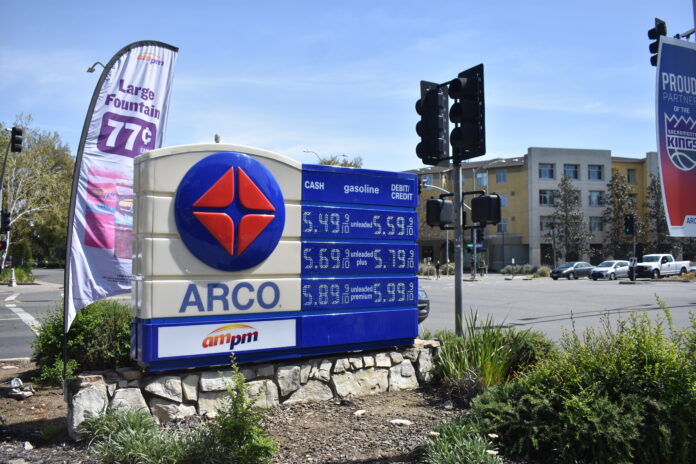Proposal comes while the U.S. is inflicting economic sanctions against Russia
By SOFIA BIREN — city@theaggie.org
The repercussions of global sanctions against Russia, due to the ongoing conflict in Ukraine, is affecting local economies. Most notably, the national average price of gas has peaked for the first time since 2008 at $4.33. In California, the price of gas has risen to an average of $5.28.
Sanctions against Russia are not the only factor that is influencing the rise in gas prices. The pandemic has also influenced the increase of gas prices vis-à-vis the decrease in demand of gasoline at the beginning of the pandemic. When the pandemic first hit the U.S., demand for gasoline decreased, thus barrels of oil for a short period of time valued less than $0. In turn, oil production decreased dramatically to match consumer demand, and when Americans began driving again, production levels have not reached pre-pandemic levels although driving has.
To combat this, California Governor Gavin Newsom has proposed a plan that would help offset the financial burden felt by Californians. In a press release published on March 23, Newsom’s Office stated that “Registered vehicle owners in California will be eligible for at least $400 per vehicle, totaling $9 billion in direct payments to millions of Californians.”
The plan proposed by Governor Newsom is estimated to cost a total of $11 billion, with nine billion dollars of that budget being allocated to gas rebate. The other two billion dollars is proposed to go toward “relief for free public transportation for three months, pausing a portion of the sales tax rate on diesel, and suspending the inflationary adjustment on gas and diesel excise tax,” according to the press release.
However, although some Californians see the benefits of Newsom’s proposed plan, they question its social and environmental impacts. If passed the plan would disperse the rebate universally regardless of income. This would mean that anyone with a registered car would receive the rebate, including the wealthiest residents. Abby Ortgea, a second-year psychology and human development major, is reluctant about the way the money is planned to be dispersed.
“Newsom should alter his plan to make it more equitable,” Ortega said. “The majority of people who need financial relief are not the people who can afford cars. The state should disperse the money to Californians regardless of vehicle ownership status, that way it would benefit the people who need it most.”
Others are also concerned about the environmental impacts of this plan. In 2018, California passed Senate Bill 100, which is aimed to completely end carbon emissions by 2045. Kyla Standard, a second-year psychology major, says that Newsom’s bill is a step back from California’s 2018 commitment to clean energy.
“The bill only plans to give a small portion of the budget to promote clean energy,” Standard said. “Instead of incentivizing driving through covering the cost of gas they could invest that money into rebates for electric vehicles or climate research.”
Other states such as Georgia and Connecticut are taking measures to achieve the same means, however these states are trying to offset the economic burden in their states by temporarily decreasing or temporarily waiving the gas tax in their state.
The taxon gasoline is used primarily to fund projects that would increase the efficiency of the nation’s roads. Primarily, this is done by maintaining the roads and highways in that state, and through other smaller projects. California has the highest gasoline tax in the country at $0.51 per gallon.
Newsom’s proposed plan is different compared to that of other states because it is aimed at giving people a rebate as opposed to partially or fully waiving the tax on gasoline. Regardless, the plan comes as a relief to UC Davis students. Some students who do have cars say that the $400 rebate would help ease the financial burdens many of them already face.
“I try to not use my car as much as I did last quarter because it would really be difficult for me to get as much gas as I did before,” Ortega said. “I feel like the rebate will definitely help students.”
Mark Soto, a second-year mechanical engineering major, says that during spring break he noticed the difference in the price of gas. He says that while on a road trip, he not only saw the overall increase in the price of gas, but he also saw the difference in gas at different stations.
“We drove to a small town in Southern California, and the gas cost around $5.50,” Soto said. “Then a few miles down there was another gas station selling gas for around $6.50.”
Some say Newsom’s plan is complex by design and was written by him and his administration to bring relief to Californians. If passed, the plan will bring relief to millions of California residents, and some UC Davis students are excited to see what impact will have on them.
Written by: Sofia Biren — city@theaggie.org




